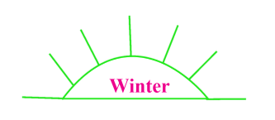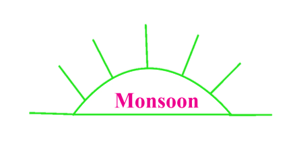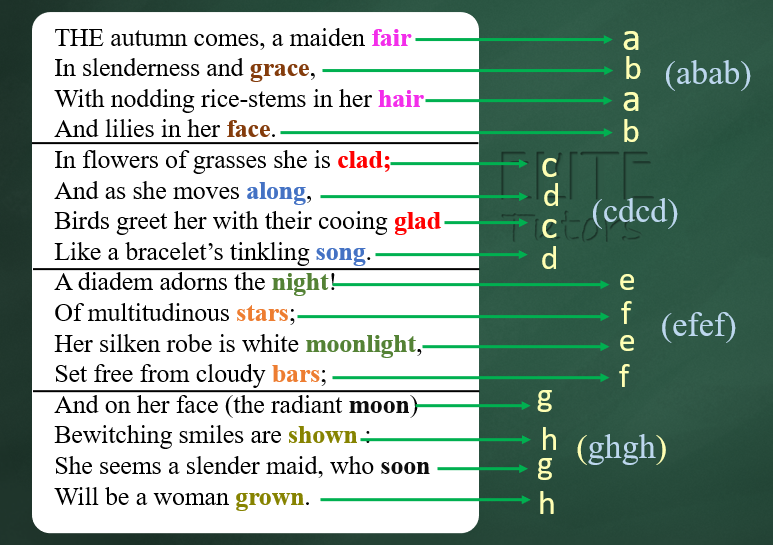… WARMING UP …
1. What changes do you see in nature in each of the following seasons ? A few sentences are given below as examples. Use these and your own to describe a season appropriately.
⇒ New grass sprouts.
⇒ We see mist in the morning.
⇒ Tender leaves shoot out on plants or trees.
⇒ There are sudden showers and
⇒ Migratory birds return. hailstorms.
⇒ The sun shines brighter than before.
⇒ Trees blossom.
Ans.
(a) Nights become longer and the days shorter.
(b) we see mist in the morning
(c) hibernation (a state resembling sleep where the animal remains inactive, usually housed in a shell, remaining so until summer arrives)

(a) The Sun shines brighter than before
(b) Migratory birds return.
(c) Trees blossom.
(d) Humidity in the air increases.

(a) New grass sprouts.
(b) Tender leaves shoot out on plants and trees.
(c) There are sudden showers and hailstorms.
(d) There is greenery everywhere.
(a) Name the six seasons according to the Indian calendar. Which of the seasons is equivalent to Autumn?
Ans.
The six seasons according to the Indian calendar are :
Vasant, Grishma, Varsha, Sharad, Hemant and Shishir.
How did the cunning Greek explain the presence of such a
large wooden horse?
Ans. The cunning Greek explained the presence of such a large wooden horse by saying that they had made this horse and left it as an offering to the god of the Sea as they were afraid of the long voyage back home.
(b) What changes do we see in the life of human beings when the season changes ? Write with reference to their (a) clothes (b) diet (c) celebrations
Ans.
The changes that we see in the life of human beings when the season changes are:
(a) Clothes: In summer season we wear cotton cloths. People mostly wear caps and goggles during summer. In winter season we wear Sweaters, mufflers etc. to protect their body from cold. In the monsoon season we wear clothes made from synthetic materials as they dry up quickly.
(b) Diet: In summer season we eat fresh fruits. Should have more liquids. Less spicy food. In winter season we like to eat hot fresh foods. Less liquid and more spicy food. In the monsoon season we drink boiled water. We like to eat roasted maize.
(c) Celebrations: In summer season we enjoy to celebrate Holi festival and spent summer vacations and even wedding ceremonies. In winter too we attend wedding ceremonies, celebrate festivals like Diwali, Muharram, Christmas, New year, etc. In monsoon we celebrate festivals like Ganesh Chaturthi, Eid and Bakra-Id, etc.
2. Guess what is personified and fill in the gaps. Choose from the brackets.
(Sun, alarm, bird, car, wind, stars, machine)
(a) The weary was also petrol -hungry.
(b) The playful whistled among the trees.
(c) The annoying screamed at 5 am.
(d) The naughty winked at me from above.
(e) The rising stretched its arms.
(f) The cheerful sang as it perched on a tree.
(g) The tireless hummed as it worked hard.
Ans.
(a) The weary ………… was also petrol-hungry.
Ans. The weary car was also petrol-hungry.
(b) The playful ……….. whistled among the trees.
Ans. The playful wind whistled among the trees.
(c) The annoying …………. screamed at 5 am.
Ans. The annoying alarm screamed at 5 am.
(d) The naughty …………. winked at me from above.
Ans. The naughty stars winked at me from above.
(e) The rising ………… stretched its arms.
Ans. The rising sun stretched its arms.
(f) The cheerful ………….. sang as it perched on a tree.
Ans. The cheerful bird sang as it perched on a tree.
(g) The tireless ………… hummed as it worked hard.
Ans. The tireless machine hummed as it worked hard.
…FACTUAL QUESTIONS…
Why is Autumn called a ‘maiden fair’?
Ans.
Autumn comes in slenderness and grace. Like a young girl she has beautified herself by having nodding rice-stems in her hair and lilies in her face. She is dressed in flowers of grasses. Hence, she is called a ‘maiden fair’.
What is the cooing of birds compared to?
Ans.
The cooing of birds is compared to the tinkling song of a bracelet.
How does Autumn dress up at night ?
Ans.
Autumn is dressed with a twinkling diadem (crown) made of multitudinous (numerous) stars. Her silken robe is the white moonlight, set free from the cloudy bars (patches).
…ENGLISH WORKSHOP…
1. Find three lines each, that contain images of nature the in the autumn season.
During daytime (1) ……………………………………………..
(2) ……………………………………………..
(3) ……………………………………………..
At night (1) ……………………………………………..
(2) ……………………………………………..
(3)……………………………………………..
Ans.
During daytime (1) With nodding rice – stems in her hair
(2) In flowers of grasses she is clad
(3) Birds greet her with their cooing glad
At night (1) A diadem adorns the night
(2) Her silken robe is white moonlight
(3) Of multitudinous stars
2. Pick out words from the poem that describe the following. List them in Column ‘A’. Substitute each of those describing words with another word/phrase of the same meaning.
Ans.
3. Find one example of each of the following from the poem :
⇒ Simile
⇒ Metaphor
Ans.
Simile – Birds greet her with their cooing glad, like a bracelet’s tinkling song.
Metaphor- Her silken robe is white moonlight.
4. Write the rhyme scheme of the poem. (Refer to the Language Study pages.)
Ans.
5. Think and write in your own words.
(a) Why is the maiden Autumn said to wear rice stems in her hair?
(b) How can the tender maiden Autumn become a full grown woman? What change in nature does this imply?
(c) Why do you think, birds greet the autumn season gladly?
Ans.
(a) I think that in the beginning of Autumn the harvesting of the rice crop is already completed and so the maiden Autumn is said to wear rice stems in her hair.
(b) In the beginning of Autumn, she is a tender maiden. Now, we know that plants shed their leaves in the beginning of the season but towards the end of the season plants starts fruiting. And so she becomes a full grown woman. It implies that time has passed.
(c) Birds greet the autumn season gladly as it is a wonderful season for them. Birds enjoy the cool autumn. Its time to migrate.
6. Compare the Indian Monsoon season to a powerful king of a prosperous kingdom. Write down a few similarities. Use them to compose a poem of your own.
Ans.
Like the powerful king of a prosperous kingdom, the monsoon in India bestows the showers of blessing to the people. As king’s duty is to provide relief to subjects, monsoon provides relief to the people. Like a prosperous king who helps all people of his kingdom irrespective of caste, creed etc. Monsoon gives rain to all people. When people don’t have food to eat they approach king for help. Similarly when farmer don’t have water for agriculture he prays God for monsoon.
Use them to compose a poem of our own
King protects his people with armour,
Showering rain monsoon protects his farmer.
King makes subject to live with peace and culture,
Monsoon gives livelihood to people by agriculture.
A king is considered to be kingdom’s God,
Monsoon plays the role of lord.
…elite tutors
7. Which is your favourite ‘Nature’ poem from your mother tongue? Write the poem and try to translate it into English. Your translation can be in the form of a poem or a paraphrase.
Ans.
पेड़ लगाओ
पेड़ लगाओ , पेड़ लगाओ,
हरा भरा जीवन बनाओ |
छाया ये हमको देता है,
फल ये हमको देता है|
बाढ़ से हमको बचाता है
प्रदूषण दूर हटाता है
हम भी पेड़ लगाएँगे
संसार को हरा भरा बनाएँगे
Translation
Plant trees
Plant trees, plant trees,
Create a green life.
It gives us shadow,
It gives us fruit.
It Protects us from floods,
It takes away pollution.
We will also plant trees,
And make the world green.
8. Read the ode ‘To Autumn’ by the famous poet John Keats. ‘Season of mists and mellow fruitfulness…’
To Autumn
…. BY JOHN KEATS
Season of mists and mellow fruitfulness,
Close bosom-friend of the maturing sun;
Conspiring with him how to load and bless
With fruit the vines that round the thatch-eves run;
To bend with apples the moss’d cottage-trees,
And fill all fruit with ripeness to the core;
To swell the gourd, and plump the hazel shells
With a sweet kernel; to set budding more,
And still more, later flowers for the bees,
Until they think warm days will never cease,
For summer has o’er-brimm’d their clammy cells.